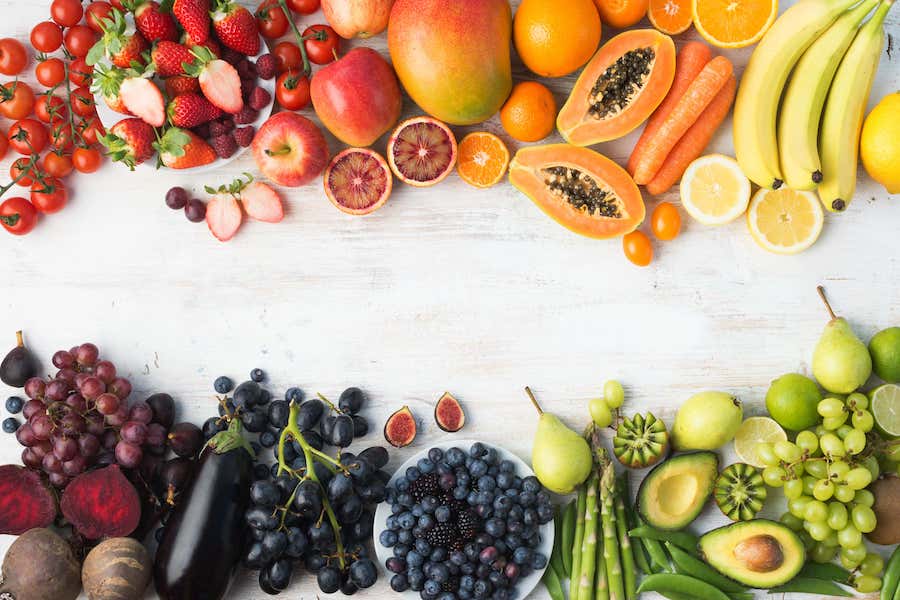These are the foods to eat to avoid colds and flu this winter
Celebrity nutritionist Gabriela Peacock, who counts Joan Collins and Jodie Kidd among her clients, reveals the hero foods your body needs.
Nutritionist to the stars, Gabriela Peacock, has revealed the immune-boosting foods to get into your diet this winter, if you want to starve off dreaded colds and bugs.
A lot of people don’t realise just how interlinked winter health and nutrition are, says the 44-year-old, but our immune system “is directly dependant on what we put within the body to create a chemical reaction – it’s really, really important”.

Peacock says we should avoid beige foods and eat the rainbow
Here are her hero foods your body needs this winter…
1. Fermented food
“Digestion support is incredibly important for immunity – 70 to 80% of our immunity actually lies within a digestive system,” says Peacock, whose celebrity clients include Princess Beatrice, Joan Collins, Jodie Kidd and Amber Le Bon.
She recommends eating live yoghurts, kefir, kombucha, sauerkraut, kimchi and tofu. “They directly increase the beneficial bacteria in your intestine, which supports the healthy microbiome – and the healthy microbiome will in turn support our immunity.”
They also contain protein. “Protein is really important for any kind of repair within the body, so when you have a cold, when you scratch your arm, when you need more hormones to be produced.”
How to add it:
Peacock recommends using live yoghurt as a base for homemade ice cream with a dash of agave syrup.
“Sauerkraut goes really nicely with any kind of rich foods, which is what we tend to eat around this time, quite heavy and oily meals, sauerkraut cuts through it,” she says.
“Kombucha is just a nice alternative when you get a bit bored of drinking water. Most of them are really, really low in sugar.”

Sauerkraut is underrated
2. Green tea
“This would be one of my one of my hero drinks, especially over this period of the year because tea is nice and warming. Green tea contains catechins which are polyphenols,” explains Peacock.
“Polyphenols are phytochemicals – plant chemicals that have numerous health benefits. One of the main benefits is immunomodulating properties [which] stimulate our immune system and decrease the chronic inflammation. Basically, when you’re looking at the immunity, you want to decrease the inflammation.”
How to add it:
If you drink coffee, Peacock suggests sticking to one or two a day and then switching to green tea afterwards.
“A really good to tip is to put lemon in green tea – you increase the absorption of the catechins, plus it gets rid of the bitter taste. Don’t make the tea too hot because the heat will kill the vitamin C.”
Matcha tea – powdered green tea – is another great way to get the nutrients but is higher in caffeine. “I would recommend thinking about it as a caffeine supplement [to coffee],” she says.

Switch your third coffee of the day with green tea
3. Pigmented fruits
“We are looking for the dark pigments, [they] will contain the polyphenols which will directly stimulate the immunity. So think about black blackberries, red raspberries, red peppers, green kale, orange or yellow pumpkins – if and you see these saturated colours, they are really beneficial.
“Eat the rainbow – beige food is not good for us. The pigment is the polyphenol.”
How to add it:
“I would recommend doing smoothies because you are keeping the fibre inside [as opposed to juicing]. If you’re doing smoothies I always recommend adding some greens that are lying in your fridge. You will not taste it at all but you increase your colours, you increase your fibre,” Peacock says.
“I don’t dislike juicing but I would never have juice on an empty stomach. You should have it with foods or have it after foods. Think of it as more of a vitamin boost – as apposed to food.”
You can buy supplements of red and green superfood powder too, which she recommends adding to smoothies, live yoghurt or soup.

Sardines pack an omega-3 punch
4. Omega-3-packed fish, nuts and seeds
“Essential fatty acids are incredibly important – the reason they’re called essential is because your body cannot produce them by itself, you need to obtain them by diet,” says Peacock. “Omega-9 and omega-6 we tend to be OK with [obtaining] but most people struggle with omega-3 because we just don’t eat enough of it. This would be oily fish; salmon, mackerel, sardines, a bit of tuna, also a vegetarian source; nuts and seeds.
“We need to at least three to four portions of oily fish per week in order to cover your basic baseline.”
Seeds, in particular, are really high in omega-3, says Peacock. “Pumpkin seeds, sunflower seeds, flax seeds, hemp seeds, also a nice variety of nuts is really important.
Omega-3 is directly anti-inflammatory. They’re [also] really important for our skin, our hair, our hormonal balance, for the way our cells communicate with each other. But the prevention of chronic inflammation is one of the main benefits.”
How to add it:
“You know what’s really good and really cheap – mackerel and sardines in a can. They’re kind of unattractive but I absolutely love them. You can get mackerel in a spicy tomato sauce [in a tin] – absolutely delicious.”
She suggests tinned sardines on toast, keeping bowls of seeds on your kitchen counter to add to everything (especially soups and porridge) and carrying nuts in your handbag.
“Food source would be preferential but you can get supplements of omega-3 – 99% of my clients need supplementation.”

Add garlic to recipes as much as possible
5. Garlic
Garlic contains sulphur (as do onions, leeks and eggs). “Sulphur is incredibly important because they stimulate the liver detoxification processes and that in turn will have a really positive effect on immunity.” Peacock says.
How to add it:
“I would add it into everything really – include it as much as possible. With garlic, you only release the sulphur-containing compounds when you crush it, so it does need to be crushed down and not cooked for too long. Add garlic very last minute. The cooking process helps for the absorption but if you overcook it, if you deep-fry garlic, it will definitely reduce its properties.”
6. Cruciferous vegetables
Cruciferous vegetables – including broccoli, cauliflower, cabbage, Brussel sprouts and kale – are really important for immunity, Peacock says, and it’s “probably the best liver-supporting group of vegetables”.
They contain liver-friendly sulphur, polyphenols and are high in fibre – which is “fantastic for digestion” (immunity and digestion are very much linked).
How to add it:
Include different kinds in your Sunday roasts, she suggests. “If some clients of mine don’t like the taste or texture of cabbage or kale [I suggest] cutting them into really small pieces – you get exactly the same benefits and you don’t [notice] the texture.”

Citrus is important in winter
7. Citrus
Vitamin C is very important this time of year. “It’s a direct antioxidant, in order to fight free radicals, which is essentially what makes us sick. If you increase antioxidants in your diet, you’re increasing the protection, you’re giving your immune system protection,” Peacock says.”Grapefruit is high in vitamin C.”
How to add it:
“If you want to increase your hydration (because not many people drink enough water), add a teeny bit of grapefruit juice to a lot of other water,” she suggests, “I use it for the kids’ water bottles. It’s important for it to be fresh [citrus] so you can get as much vitamin C as possible.”

These principles are incorporated in Gabriela Peacock’s latest book, 2 Weeks to a Younger You. Supplements are available at GP nutrition.
The Press Association
Latest posts by The Press Association (see all)
- 5 new books to read this week - March 26, 2025
- 6 things a physio wishes people over 60 would stop doing - March 25, 2025
- NHS reminder to 7.5m people as Covid-19 jab booking system opens - March 25, 2025
- The truth about cholesterol – what you need to know - March 25, 2025
- Prince William calls Dame Mary Berry a ‘national treasure’ in 90th birthday message - March 24, 2025




















